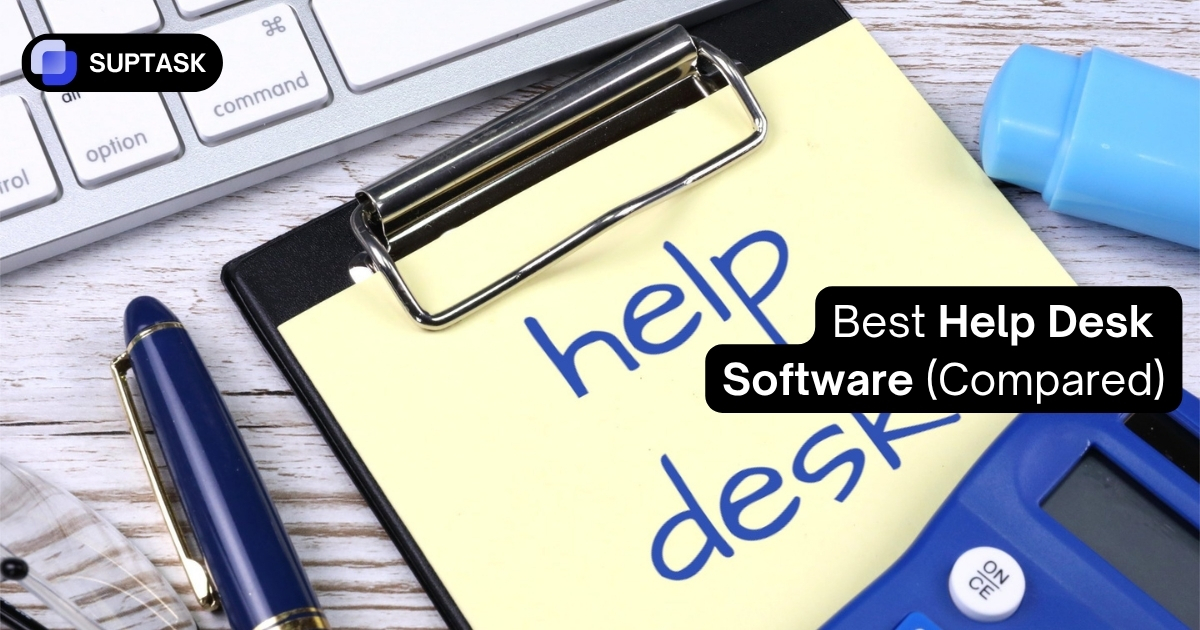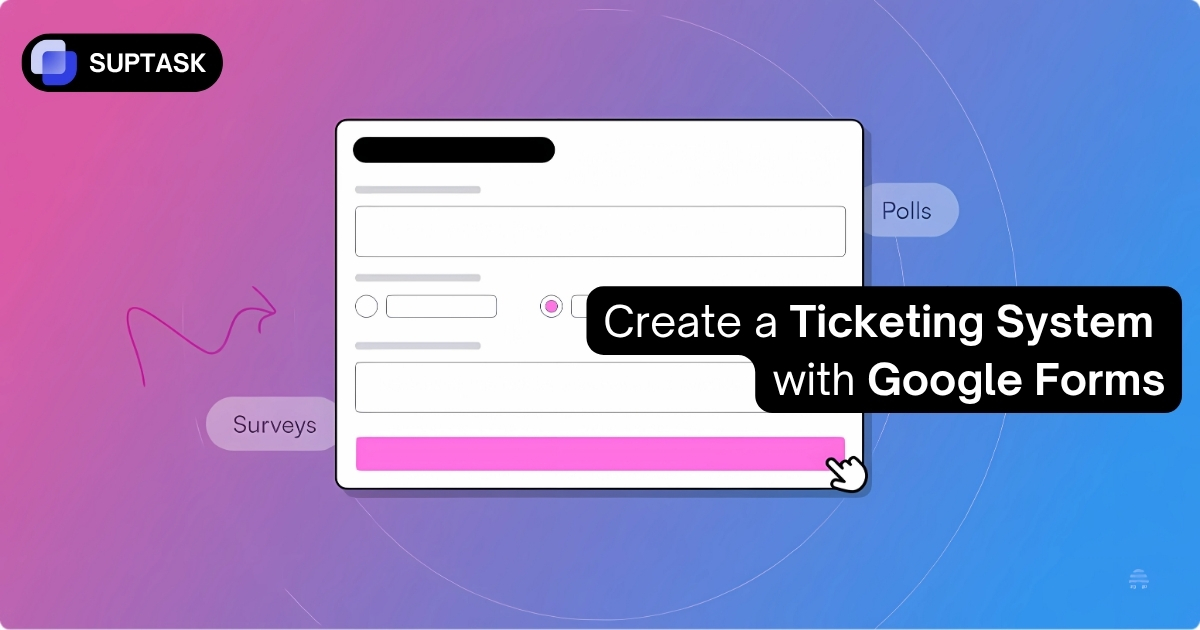What exactly is customer service software, and why is it crucial for businesses?
Customer service software refers to tools designed to collect, manage, and address service requests from a central location.
These solutions help support teams track, organize, and respond to customer inquiries across various channels, including email, phone, live chat, and social media.
Key Takeaways
- Explore top customer support software solutions tailored for diverse business needs, featuring tools like ticket management, automation, and omnichannel support.
- Key benefits of customer support software include improved responsiveness, enhanced team collaboration, and scalability, which empower businesses to manage customer interactions efficiently.
- Stay ahead of the curve by embracing trends such as personalized interactions, AI integration, and the necessity of omnichannel communication to elevate customer satisfaction.
Different Types of Customer Service Software
There are several types of customer service software, each catering to specific needs:
- Help Desk Software;
- Live Chat Software;
- Knowledge Base Software;
- Customer Relationship Management (CRM) Software;
- Social Media Management Tools;
- Self-Service Portals;
- Ticketing Systems.
Key Features of Customer Support Software
When evaluating customer service tools, look for these essential features:
- Ticket Management: Efficiently organize and prioritize customer inquiries
- Multi-Channel Support: Seamlessly handle requests from various communication channels
- Knowledge Base Integration: Provide self-service options for customers
- Automation Capabilities: Streamline repetitive tasks and improve response times
- Real-Time Analytics: Gain insights into support performance and customer satisfaction
- Customizable Workflows: Tailor the software to fit your unique business processes
- AI-Powered Chatbots: Offer instant support and reduce agent workload
- Mobile App Support: Enable on-the-go access for support teams
- Integration with Other Business Tools: Ensure smooth data flow across your tech stack
Top 15 Customer Support Software Solutions for 2024
Choosing the right customer service platform can be challenging due to the abundance of options available.
These platforms have various features to enhance customer support efficiency and elevate the overall customer experience.
We've compiled a list of 15 leading customer support software options for 2024, each offering unique advantages.
1. Suptask

Suptask enhances customer support efficiency by integrating ticketing with Slack.
This integration, known as one of the best customer support softwares, allows support teams to handle customer support tickets directly within the messaging app, streamlining communication and reducing context switching.
Key features:
- Customizable forms for precise ticket routing;
- Automation capabilities for simplified ticket processing;
- Performance analytics to track resolution times;
- Secure management of sensitive financial data.
2. Help Scout

Help Scout manages customer interactions via email, live chat, and social media, offering a unified approach to customer support.
Key features:
- Shared inbox for team collaboration;
- Knowledge base for self-service support;
- Live chat integration;
- Customer satisfaction surveys.
Pricing starts at $20 per user per month, with a 15-day free trial available.
3. Freshdesk

Freshdesk provides robust help desk and omnichannel support for small to large organizations.
Key features:
- AI-powered responders;
- Field service management;
- Team collaboration tools;
- Customizable ticket forms.
Pricing starts at $15 per agent per month, with a free version available.
4. Salesforce Service Cloud

Salesforce Service Cloud, one of the leading customer success tools, integrates with Slack to improve teamwork and refine customer service processes.
Key features:
- AI-powered case routing and classification;
- Omni-channel routing;
- Knowledge management;
- Advanced analytics and reporting.
Starting at $25 per monthly user, it provides a comprehensive solution for managing customer support needs.
5. Zoho Desk

Zoho Desk is known for its user-friendly interface and robust integration capabilities with other Zoho applications.
Key features:
- AI-powered assistant (Zia);
- Customizable help center;
- Team collaboration tools;
- Advanced reporting and analytics.
Pricing includes a free plan and premium plans starting at $7 monthly per user.
6. LiveAgent

LiveAgent employs a gamification strategy to make customer support engaging for representatives.
Key features:
- Real-time chat monitoring;
- Video calling support;
- Time tracking;
- Gamification elements.
Services start at $9 monthly per agent, with a free plan available.
7. HubSpot Service Hub

HubSpot Service Hub is an all-encompassing customer support solution that integrates seamlessly with the HubSpot ecosystem.
Key features:
- Customer feedback surveys;
- Knowledge base creation tools;
- Reporting dashboard;
- Integration with HubSpot CRM.
Pricing options start at $18 monthly, with a free plan available.
8. ServiceNow

ServiceNow is designed for IT departments within large corporations, offering advanced features for complex support needs.
Key features:
- IT service management;
- AI-powered virtual agents;
- Predictive intelligence;
- Performance analytics.
Pricing is available upon request and tailored to enterprise clients.
9. Olark

Olark specializes in live chat solutions for real-time customer communication.
Key features:
- Customizable chat box;
- Team management tools;
- Automated messages;
- Detailed chat analytics.
Pricing starts at $19 per agent monthly, with a two-week free trial available.
10. Text-Em-All

Text-Em-All offers automation services for phone communications, handling large volumes of customer interactions through mass calls and texts.
Key features:
- Mass texting and calling;
- Automated voice messaging;
- Two-way conversations;
- Detailed reporting.
Pricing starts at $10 per month, with a free plan available.
11. Helpshift

Helpshift offers in-app assistance for mobile applications, enhancing customer experience through chat and self-service capabilities.
Key features:
- In-app messaging;
- AI-powered bots;
- Knowledge base integration;
- Analytics and reporting.
Plans start at $150 monthly, with a free plan available.
12. Sprout Social

Sprout Social helps businesses improve their social media customer support by providing monitoring and engagement tools across multiple platforms.
Key features:
- Social media monitoring;
- Engagement tools;
- Analytics and reporting;
- Team collaboration features.
Pricing starts from $249 per month.
13. Intercom

Intercom offers a comprehensive customer communication platform that combines live chat, chatbots, and a help center.
Key features:
- Customizable chatbots;
- Product tours;
- Customer segmentation;
- Integration with 300+ tools.
Pricing starts at $39 monthly, with custom plans available for larger enterprises.
14. Gorgias

Gorgias is a customer service platform specifically designed for e-commerce businesses, integrating seamlessly with popular e-commerce platforms.
Key features:
- Order management within the helpdesk;
- Automated responses;
- Social media integration;
- Revenue statistics.
Pricing starts at $60 monthly for small businesses, with custom plans available for more significant operations.
Benefits of Using Customer Support Software
Implementing the right customer service software can bring numerous benefits to your business:
- Improved customer satisfaction through faster, more efficient support;
- Increased team productivity and collaboration;
- Enhanced data analysis for better decision-making;
- Streamlined workflow management and reduced response times;
- Improved customer retention through personalized experiences;
- Cost savings through automation of routine tasks;
- Better insights into customer needs and preferences;
- Scalability to support business growth;
- Consistent omnichannel support experiences;
- Improved brand reputation through excellent customer service.
If you're looking to improve your support team’s effectiveness, understanding the structure of a help desk is crucial. Tier 2 Help Desk Support focuses on resolving more complex issues, typically after Tier 1 support has been exhausted. This level of support requires skilled agents with advanced problem-solving abilities, ensuring that customer issues are addressed quickly and accurately
FAQs
What are the features of customer service software?
Key features include ticket management, multi-channel support, knowledge base integration, automation capabilities, real-time analytics, customizable workflows, AI-powered chatbots, and mobile app support. These tools enhance efficiency and customer satisfaction.
What are the key features of customer service?
Essential customer service features include responsiveness, empathy, problem-solving skills, product knowledge, clear communication, patience, and the ability to handle difficult situations. These qualities ensure positive customer experiences and build loyalty.
What softwares are used in customer service?
Popular customer service software includes Zendesk, Freshdesk, Salesforce Service Cloud, HubSpot Service Hub, and Intercom. These tools offer features like ticketing systems, live chat, knowledge bases, and analytics to streamline support operations.
How are systems and software used to support customer service?
Customer service systems and software centralize customer interactions, automate routine tasks, provide self-service options, and offer analytics for performance improvement. They enable faster response times, consistent support across channels, and data-driven decision-making.
What are the benefits of using customer support software?
Benefits include improved customer satisfaction, increased team efficiency, better data analysis, streamlined workflows, reduced response times, enhanced customer retention, cost savings through automation, and scalability for growing businesses. These advantages contribute to overall business success.













